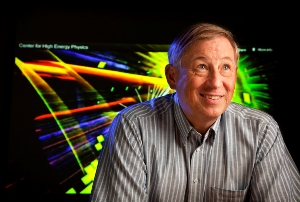Oct 9 2013
The theoretical work of Peter Higgs and Francois Englert, honored today by the Royal Swedish Academy of Sciences with the 2013 Nobel Prize in Physics, "is an amazing intellectual achievement," says University of Oregon particle physicist James Brau.
 James Brau
James Brau
The recipients were recognized for the theory developed in the 1960s of what is known as the Higgs field, which gives elementary particles mass. U.S. scientists, including a team from the UO's Oregon Center for High Energy Physics, led by Brau, played a significant role in the experiments that discovered the particle that proves the existence of the Higgs field, the Higgs boson. Those experiments were performed at the Large Hadron Collider at the CERN laboratory in Europe.
"The development of the Higgs mechanism by this year's Nobel recipients and others who also contributed to the theory was an amazing achievement in understanding the fundamental nature of the origin of mass and the mechanism behind the distinct appearance of the electromagnetic force as well as the weak nuclear force," said Brau, the UO's Knight Professor of Natural Science. "In the Higgs theory, these two forces are unified, much as Maxwell unified electricity and magnetism in the 19th century. Only subtle hints were available to the theorists to develop the Higgs theory, and it was half a century before experiments could confirm the idea. This is an amazing intellectual achievement of the highest scientific significance. The recipients are highly deserving of this honor."
Approximately 2,000 physicists from U.S. institutions — including 89 U.S. universities and seven U.S. Department of Energy laboratories — participate in the ATLAS and CMS experiments, making up about 23 percent of the ATLAS collaboration and 33 percent of CMS at the time of the Higgs discovery. The Department of Energy's Brookhaven National Laboratory serves as the U.S. hub for the ATLAS experiment, and the Department of Energy's Fermi National Accelerator Laboratory serves as the U.S. hub for the CMS experiment. U.S. scientists provided a significant portion of the intellectual leadership on Higgs analysis teams for both experiments.
UO particle physicist David Strom was the trigger coordinator — the person responsible for selection of the data captured and analyzed — at ATLAS during the experiments that appear to have fulfilled the Higgs theory. Strom recently was chosen by the ATLAS Trigger and Data Acquisition (TDAQ) system's institutional board as TDAQ co-leader as of Aug. 1; In March 2015, he begins a one-year term as overall project leader for the system.
This morning, Strom was among scientists at CERN who celebrated the announcement. "I was pleased to join my colleagues from ATLAS and CMS in listening to the live announcement of the 2013 Physics Noble Prize here at CERN," Strom wrote in an email. "We all applauded François Englert and Peter Higgs for their pioneering work which was vindicated by our experiments last summer. We are grateful to the Nobel committee for recognizing the work of ATLAS and CMS in their citation."
His UO colleague Eric Torrence was chosen by the ATLAS institutional board, made up of a representative of each participating institution, to serve as data preparation deputy coordinator effective this month; he will serve as coordinator for a year beginning in October 2014.
Another UO particle physicist, Stephanie Majewski, also a member of the ATLAS Collaboration, is working on the upgrade of the ATLAS detector, which will resume running next spring. Majewski, who previously worked at CERN as a member of Brookhaven National Laboratory's ATLAS team before joining the UO last year, is installing demonstration hardware into the detector for the next phase of experiments. When new experiments resume, Strom said, they will be performed at higher energy and "open the door for discoveries that we hope will be even more dramatic."
In addition to UO faculty representation at the Large Hadron Collider, many UO graduate students have conducted physics research at the Geneva site, and more will have the opportunity when experiments resume.